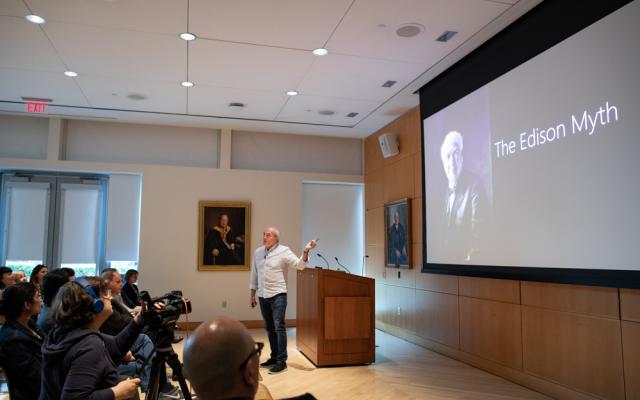
Bill Buxton is not waiting for the next big thing; he knows it’s already here. Buxton was on campus recently delivering his talk "The Importance of History in Shaping the Future" as part of The Creative Mind and Leadership lecture series. His message to the standing room only crowd was to find the next innovations we need only look at what already exists with new eyes. “The next big thing is not a thing, it is a changed relationship with things that are already here.” Recycle, Reuse, Renew at its finest.
He pointed to several examples of modern innovations that were actually ideas and inventions that have been with us for quite some time. The Rollerblade inline skate sensation of the early 1980’s was patented in 1819 and invented in 1735! Looking into the past may be the best way to enhance our future.
Buxton is a Principal Researcher at Microsoft Research, and also a musician and musical instrument creator, computer scientist, equestrian, designer, pioneer in human-centered computer interaction, collector of interactive devices, writer, devoted husband, and an avid outdoorsman. You might be tempted to call Buxton a Renaissance man, but you probably shouldn’t. “In the Renaissance, there were no Renaissance men. De Medici had to fund da Vinci. If da Vinci was such a Renaissance man, why didn’t he secure his own funding?” This quote speaks to Buxton’s idea that there is no one single, black-clad, genius entrepreneur or inventor; everyone needs a team.
Speaking further on the concept of innovation as a team sport, Buxton noted that Edison is credited with thousands of patents but what were all the people in his lab doing? Edison was standing on their shoulders. “Don’t strive to be the inventor -- work to make a difference.” Buxton advises students to find a mentor who allows you to stand on their shoulders and teaches you to be ready to pull up the next generation to stand on yours.
Buxton also touched on the moral implications of innovation and the idea that innovation doesn’t always equal progress. “My generation asked of technology, 'What can we do?' This generation needs to ask, 'What should we do?'”